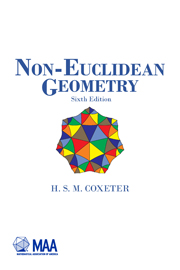Book contents
- Frontmatter
- PREFACE TO THE SIXTH EDITION
- Contents
- I THE HISTORICAL DEVELOPMENT OF NON-EUCLIDEAN GEOMETRY
- II REAL PROJECTIVE GEOMETRY: FOUNDATIONS
- III REAL PROJECTIVE GEOMETRY: POLARITIES, CONICS AND QUADRICS
- IV HOMOGENEOUS COORDINATES
- V ELLIPTIC GEOMETRY IN ONE DIMENSION
- VI ELLIPTIC GEOMETRY IN TWO DIMENSIONS
- VII ELLIPTIC GEOMETRY IN THREE DIMENSIONS
- VIII DESCRIPTIVE GEOMETRY
- IX EUCLIDEAN AND HYPERBOLIC GEOMETRY
- X HYPERBOLIC GEOMETRY IN TWO DIMENSIONS
- XI CIRCLES AND TRIANGLES
- XII THE USE OF A GENERAL TRIANGLE OF REFERENCE
- XIII AREA
- XIV EUCLIDEAN MODELS
- XV CONCLUDING REMARKS
- APPENDIX: ANGLES AND ARCS IN THE HYPERBOLIC PLANE
- BIBLIOGRAPHY
- INDEX
XIII - AREA
- Frontmatter
- PREFACE TO THE SIXTH EDITION
- Contents
- I THE HISTORICAL DEVELOPMENT OF NON-EUCLIDEAN GEOMETRY
- II REAL PROJECTIVE GEOMETRY: FOUNDATIONS
- III REAL PROJECTIVE GEOMETRY: POLARITIES, CONICS AND QUADRICS
- IV HOMOGENEOUS COORDINATES
- V ELLIPTIC GEOMETRY IN ONE DIMENSION
- VI ELLIPTIC GEOMETRY IN TWO DIMENSIONS
- VII ELLIPTIC GEOMETRY IN THREE DIMENSIONS
- VIII DESCRIPTIVE GEOMETRY
- IX EUCLIDEAN AND HYPERBOLIC GEOMETRY
- X HYPERBOLIC GEOMETRY IN TWO DIMENSIONS
- XI CIRCLES AND TRIANGLES
- XII THE USE OF A GENERAL TRIANGLE OF REFERENCE
- XIII AREA
- XIV EUCLIDEAN MODELS
- XV CONCLUDING REMARKS
- APPENDIX: ANGLES AND ARCS IN THE HYPERBOLIC PLANE
- BIBLIOGRAPHY
- INDEX
Summary
Equivalent regions. Two polygonal regions in a plane are said to be equivalent if they can be dissected into parts which are respectively congruent. For instance, in Fig. 9.6D, the triangle ABC is equivalent to the isosceles birectangle ABED, since the parts CFJ and CFI of the former are congruent to the parts ADJ and BEI of the latter. That the relation of equivalence is transitive may be seen by superposing two dissections to make a finer dissection. Regions bounded by curves can be treated similarly, by regarding them as limiting cases of polygonal regions.
This notion enables us to define the area of any region in terms of a standard unit region, as follows. A region is said to be of area 1/n (where n is a positive integer) if the unit region can be dissected into n parts each equivalent to the given region; and a region is said to be of area m/n if it is equivalent to m juxtaposed replicas of a region of area 1/n. By a natural limiting process, we obtain a real number as the area of any given region.
- Type
- Chapter
- Information
- Non-Euclidean Geometry , pp. 241 - 251Publisher: Mathematical Association of AmericaPrint publication year: 1998

